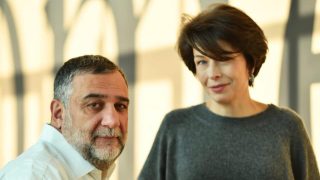Mark Duffy about the challenges and opportunities in Ireland, US President Joe Biden’s connection to Ballina
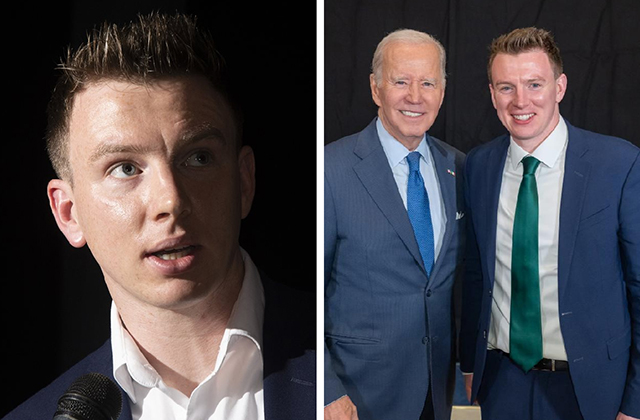
“I am not a journalist, but I have something to do with journalism: I write the press releases myself,” Mark Duffy, the mayor of Ballina, Ireland, once told me. It was a surprise for me, as in the case of big cities in Armenia, the municipalities have news services, and in the case of small towns and even villages, the assistants of the community leaders or other responsible persons write the press releases.
In that period, Mark Duffi and I were in Brussels, participating in the Transatlantic Inclusion Leaders Network (TILN) 2023 fellowship of The German Marshall Fund of the United States, and we had almost no free time. However, since Mark’s story was very different and inspiring, we could manage an interview about his experience, the similarities between Ireland and Armenia, US President Joe Biden’s connection to Ballina, etc.
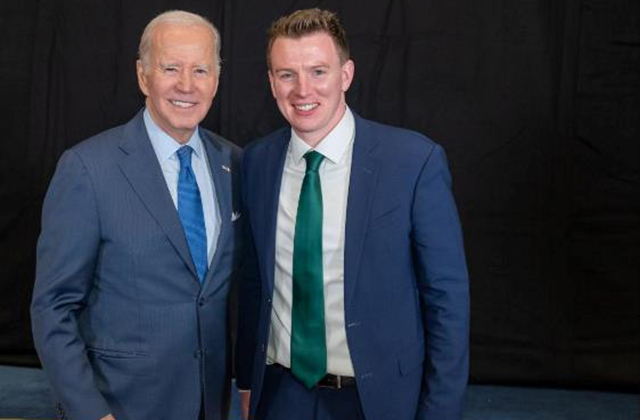
-Mark, why you decided to participate in elections and become the mayor of Ballina, what was your motivation?
-I grew up in a small town West Coast of Ireland. I’m the second youngest of 13 children. The story of Ireland is a similar one to Armenia: a lot of immigration. Our people are great people with great hearts and minds, all in search of better opportunity elsewhere. I was previously a Students’ Union president at my University, and there was the first experience in my life where I worked and represented people. I worked with representative people meaningfully, and it was a great joy.
When I went for the Students’ Union president’s job, I asked myself three questions: would I like to do it? Would I be good at it? and would I regret it if I didn’t do it? And I answered “Yes” to all three.
And that was a kind of foundation for me to go forward for that Students’ Union president job, so after a few years of travel and working in corporate business in Dublin, I was sitting at my desk and asking myself the same questions when I saw there was an opportunity of the local elections back home.
This hometown has excellent potential, a beautiful part of the world, and great people, but many people also leave. So, I asked myself the same three questions, and even though I felt nervous, even though in my stomach it was almost a nervous anticipation, I said OK, I’m going to go for it. So, I announced it. There wasn’t much change in terms of the political representation in the town, and often it’s passed on to sons or family members and stays within circles. Тhere’s no dynamic or no change in the structure. That was uncomfortable for me, and I was looking around who would step up and do this.
I want along to a US embassy event with young leaders from all over Ireland, and the deputy head of the mission said you are the future leaders. And in my head, it was like, OK, we keep being told this in all of these circles: we are young leaders, you are a young leader. When will I step up and be that person? I said, OK, I’m going to do it, and I’m going to go for it. If I didn’t get elected, I would have no embarrassment or failure because at least I would have been brave enough to step up and try to change the system. People responded very positively.
I moved back from Dublin, and I set up a voluntary group. We met for one hour each week to pick up rubbish, paint old buildings, and plant trees and flowers to try and enhance our town, and the work was important, but most of our job was symbolic because it was a form of peaceful protest. We were saying no, this is our town, and this is for young people as well, and this is a chance to change, take back control, and empower everyone. Because everyone has excellent ideas and great skills, like architecture, engineering, research, and environmental issues, those voices need to be empowered. That’s what I set about doing, and four years later, we’re still doing that without over 1000 volunteers. We have seen a positive change within the town.
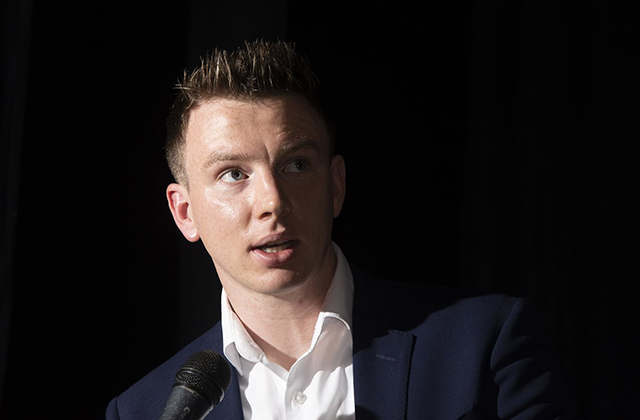
-Who was the 1st person who supported your decision? Was it your family member or maybe a politician?
-I met former representatives of the town and let them know my intentions and what I plan to do. It was out of respect, but the 1st people I told it was at Christmas when we went down on a beautiful night and a local beach. I remember the lovely stars in the sky; my brother was home from Canada, and he’s part of that story of Irish emigration, I have a brother in Canada another in Dubai and another in Australia, so I have family all of over the world, and then I told that I’m thinking about this, and my brother said OK, why not. I’ve got much encouragement from family and friends. And then I had great support from many people locally, a local lawyer very actively supported me, and there were 3 of us who set up the community group: one was a painter and decorator, he is like a machine, so energetic and passionate about the town and he was empowered through all this process and is a leader now in the town in terms of work he does. It allowed people to be a part of the town that wasn’t as accessible previously, and that’s been very powerful.
-Do you remember the 1st day you were elected and went to your workplace? What were your feelings? Maybe you were scared?
-I wasn’t scared as much; I was trying to digest the process, everything. I knew that it was going to be difficult because I had idealistic views and visions, but you need to learn to navigate your way through a political system that has many challenges; you need to learn that as a young politician that maybe other politicians might not want to see all of your ideas succeed and you need to be creative in how you move forward with your ideas. Try to do it proactively, in a respective manner, but also keep firm to your beliefs.
– What was your first decision as a mayor? Do you remember? What did you want to change?
-We did things like trial pedestrianization of the streets, trying to give the town back to its people. We succeeded by trialing having music on the streets, entertainment, and prioritizing people instead of cars. Now we do it more on an adhoc basis for events. Another thing was celebrating our people: we have people that would claim their heritage from the USA to Ireland, and we created different artwork pieces of murals of people from our town or people who had connections to our town. And one of them has been US President Joe Biden. So a group of volunteers prepared a huge mural erected on a wall before the election when Donald Trump was still the president, and that became a centerpiece for international media who came to Ballina to speak about Joe Biden’s heritage. When he got elected he promised to come to Ballina. Four weeks ago, he came and visited and made a speech to an audience of 27 000 people right in the middle of our town.
-When was that?
-April 14th. My job was introducing our prime minister and Joe Biden to the stage. That was an extraordinary moment and a great honor; I was fortunate to be in this position at this time of my career. What was nice in all was that I had made decisions in Ireland, a republic which enabled someone like me to run for politics, Ireland had fought against British oppression for 800 years. Our ancestors, our people, fought for the freedom. Freedom and democracy are fragile and important to protect, but also it is a great privilege. I was very fortunate that he was the US president, and I had made the decision to join politics 4-5 years ago and that it would lead to this moment.
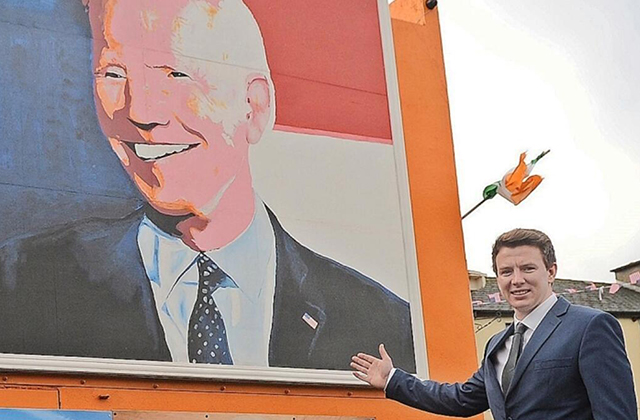
-I decided to interview you because you said you do everything alone in our conversations. It was a big surprise for me as you even wrote the press releases. So how do you conduct your job?
-It is, like I said, much hard work and much empowering of people, I don’t have staff support, secretarial support, or social media support. Everything in my communications is directly from me, which is a challenge. If you are in the national Parliament, you have a lot more support from the staffing office. Much of my work is strategically informing decisions and supporting groups and organizations, to help them do their job. I don’t need to be hands-on, on certain things. I like to empower and support initiatives, charities, organizations, supporting organizations and social enterprises. In our town we have welcomed a large influx of Ukrainian refugees and asylum seekers to the town many of whose are staying in our hotels.
Ukrainian refugees that come to town have become involved in our voluntary group. They are an active part of the community, every Saturday morning, they meet new people and network and are integrated into the town. During the Saint Patrick’s Day parade this year, they walked with banners saying “Thank you, Ballina, for welcoming us”.
It was a lovely moment, and that shows the positivity, if you can engage people and work with people. In this group, we’ve had 1000 volunteers, I’m not there all the time. Paddy one of the main leaders of the group is over 75 and he has been there every Saturday morning for the last three years coordinating and organizing volunteers. It’s this selfless volunteerism that makes our town a success.
-So, you have many volunteers there.
-Initially we publicized the work on my own social media. “We’re doing an 8 AM on Saturday”, but then I said no, this needs to be its own entity because even if you support a different political party, you can still care about your town.
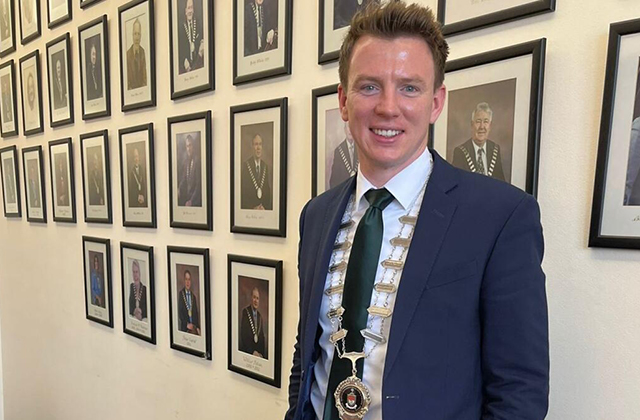
-Is this typical for every Mayor in Ireland, or is this your way of working? For example, in Armenia, mayors have a lot of staff who do everything and even pay money from the budget for their social media boosting.
-It is not so typical. I don’t want to speak for other mayors in other areas, but I know what we’re doing in Ballina is very special and resonates well with people. People enjoy it.
It could be replicated all over because this program teaches us that we have young people who are passionate about their town, their community, and the future of their country and its place in the world. We need those young voices to be empowered to make it a more cohesive society and a better place. Young people are sometimes disrespected. It’s often time I see in different organizations. When young people are empowered, they lead naturally, give them time and skills, give them the ability and an opportunity to lead, and they always do well if you trust people.
-Next year, you’ll have new elections?
-Yes.
-When you reflect on what you did well and what you want to change.
-What I did well is, like I said, empowering people and getting people involved. We have some great projects now running in our town, in the square we are innovating the whole center, building a new public space, a new museum, and different things like that. I am active online as well, trying to get the messages out there to people. Sometimes the more you tell people about something, the more you need to prioritize doing something, so it is a balancing act. I would like to focus on the town because the town needs a lot of work and attention. But I would like to broaden that out into smaller villages in areas and give more focus on a broader area because, in our town, we sometimes feel neglected by government institutions, but equally, other towns and villages feel the same. So I would love to help mobilize more people in a broader area in a wider region.
–What are the main issues in your town that would you like to solve?
-The biggest issue is housing; it’s incredibly expensive and challenging. It’s slowly changing because there are outstanding grants and opportunities now from the government to help you build a home or to regenerate an old building. So, our biggest issue of the day is housing.
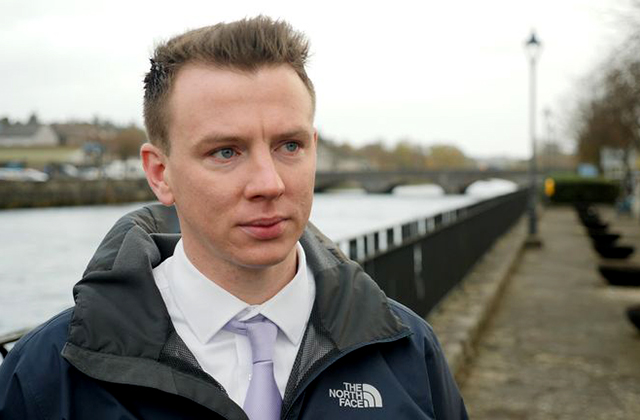
-Do you have any strategy to solve that issue?
-Yes, we’re regenerating old buildings, but also working with skilled young architects who have returned to the town from Rotterdam, one in particular, and we want to try to build strategic development zones of housing developments and housing projects. They must have an ambitious size scale, but built in the best way: create a great town to live in, which is also going to be a great town for people to visit—so having remote working space in a new development, having gym space, having café space, making it a pleasant environment for people to live and attractive. That’s something that we are working on at the moment, to try and create a nice future focused housing development in the town center so you can walk and move everywhere, you don’t have to get into a car.
-How people react to changes and behave when seeing you in the streets.
-When I walk the streets, it is very nice; I get many people saying hello and talking about their issues. Listening to and hearing their issues, recommendations, ideas, and complaints is always helpful. It’s sometimes difficult to move from one side of town to the other if you are walking somewhere because you are always stopped, but the people are amiable. It’s a balance.
I don’t get everything right; the challenge is not having a resource, so that’s difficult. So if I have many requests for support for housing single mothers’ difficult domestic situations, I care. However, it’s challenging to find solutions for every single case while focusing on a better, more comprehensive strategy to develop ambitious housing that will solve the problem for everybody and the next generations who have their challenge. That’s a struggle with your heart sometimes because you need to be focused on strategically trying to help difficult individual cases, so it’s a balancing act.
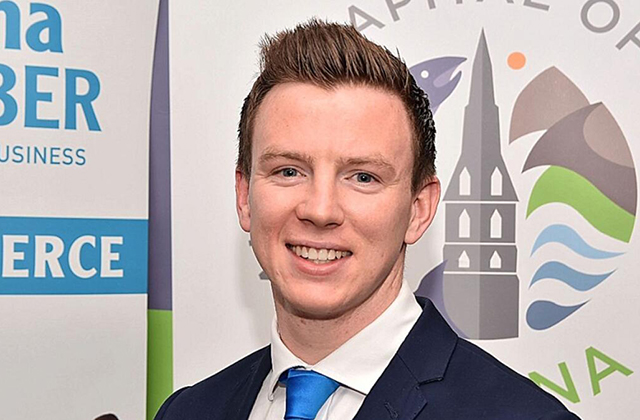
-Why you decided to participate in the TILN fellowship?
-I’d met with the US ambassador and embassy staff, and they made me aware of the program. I thought this was a prestigious program. I think about Ballina, I think about Ireland as a place you need to act locally but with a global mind, and I think the job of the Mayor is head down focused on the day-to-day trying to make many things happen, to help lots of people, but every so often you need to take a step back and look forward, look ahead as a leader. The better I am as a person and the more skilled I am, the broader my understanding of society, the better I can deliver for Ballina, Mayo, and Ireland. The future is a collaboration with our friends across Europe and the United States; this was a brilliant opportunity that would be good for my development.
It made sense to me. That is why I applied, and I was really fortunate to be accepted and meet great people. It’s been a wonderful program, and it will take some time to digest everything and everyone we’ve met, the stories, the people, the learnings, and what’s stuck with us. Learn about yourself and what other people find valuable to us. Then that gives you more confidence to talk about your story back home and to others. It’s been an incredible experience, and it is a privilege to have everything we have been afforded during that week. Not many people have the opportunity to do it, and what’s been so refreshing, to meet such nice people.
-It is also talking about you as a person because, again, not all mayors work on their personal and professional development.
-I took a salary decrease to leave my job to move back home because it’s what I’m willing to get up in the morning for and work on until midnight. That requires patience from my family, friends, and loved ones because I could be gone to different events here and this week, and people want your attention all the time, and it’s always hard to manage that in a way that protects you so that you can be a better person to work for them. I am fully motivated and privileged to be in my position. What motivates me is meeting people like you and people we’ve met during the week; it’s with enthusiasm for a better future for us all.
By Razmik Martirosyan
Brussels-Yerevan












